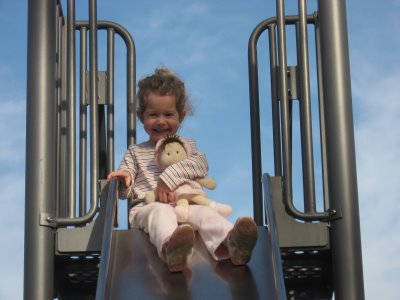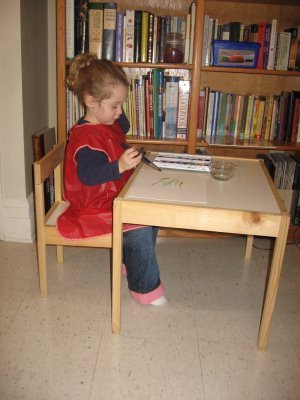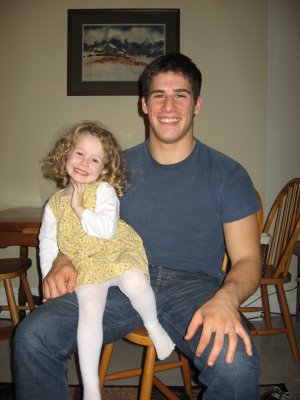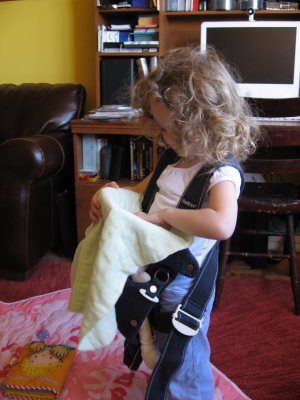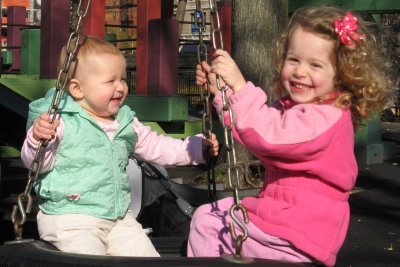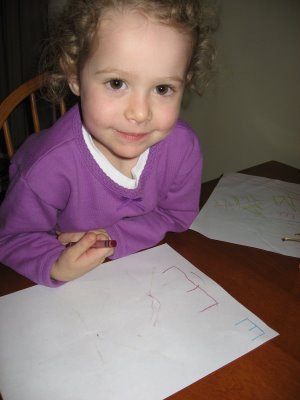Thursday, November 30, 2006
I'm in the class!
This afternoon Elisabeth and I went to a class for preschoolers at a museum. Today we looked at animals in ancient works of art, one of which was a sculpture of a lion. The curator directed the children's attention to how the sculptor had created the appearance of a mane by using wavy lines. She said, "Let's all say 'mane.'" So, trying to model the kind of participation I wanted from Elisabeth, I joined in: "Mane." Elisabeth turned to me and said:
"Don't say 'mane.' I'm in the class!"
Posted by
Graham
at
10:13 PM
0
comments
![]()
Labels: Elisabethisms
I will warn you whom to fear
I have often heard Christians say, "We're not supposed to fear God; we're supposed to love Him," or "fear means to revere." Then I read Jesus' words:
"I tell you, my friends, do not fear those who kill the body, and after that have nothing more that they can do. But I will warn you whom to fear: fear him who, after he has killed, has authority to cast into hell. Yes, I tell you, fear him!" (Luke 12:4-5)
Jesus is telling us not to fear (and He means that in the ordinary way we use that word) those who kill the body. Don't fear murderers. Don't fear terrorists. But do fear; fear the One who has authority to cast into hell (and he uses that word in just teh same way He did in the previous sentence).
I'll gladly accept that we ought to revere the One who has authority to cast into hell, but the language Jesus uses here goes far beyond that. He is saying that there is something far more fearful than death; and the One who has the authority over it is to be feared more than death. Truly fearing Him is what will enable us to live without any fear in this life: "Fear not; you are of more value than many sparrows" (Luke 12:7). The One to be feared supremely cares for us! This is good news! We can (and must) fear Him and trust Him and love Him at the same time!
If we fear Him as we ought, we will live with unimaginable freedom in this world.
Posted by
Graham
at
9:24 PM
0
comments
![]()
Labels: Theology
Wednesday, November 29, 2006
A Weekend with Wendell
 Have you ever dreaded a particular guest in your home? Parents and children alike can resonate with Sophie in A Weekend with Wendell.
Have you ever dreaded a particular guest in your home? Parents and children alike can resonate with Sophie in A Weekend with Wendell.
Posted by
Graham
at
8:07 AM
0
comments
![]()
Labels: Children's Literature
What every parent wants
Last night we had some of Rebecca's colleagues over for dinner (5 adults, no children). Elisabeth was thrilled to show them her room and her toys when they arrived. Then she sat at the table with us for dinner, got down to play while we prepared for dessert, and then sat at the table again for dessert. While we were still at the table, she said, "I'm ready for bed." So we went and put her pajamas on, and came back to brush her teeth. Then, with all the guests still seated at the table, she walked into her room (which is adjacent to the living/dining room), climbed in bed, and asked me to turn off the lights. So I came in, closed the door, turned off the lights, and in less than five minutes she was asleep - and I was able to return to our guests.
That has never happened before, but I pray that it happens again! It made having guests so easy!
Posted by
Graham
at
7:08 AM
0
comments
![]()
Labels: Milestones
Tuesday, November 28, 2006
Consistency counts
Last week Elisabeth and I went to an art museum. I was pushing the stroller and allowing her to walk. She saw a bench, got excited, and ran to it to climb and sit. I walked over to her and explained that if she ran again and didn't stop when I spoke to her, that she would have to sit strapped in the stroller. Several times during our museum visit, she again got excited and started to run. As soon as I said her name (and I didn't say it loudly), she stopped dead in her tracks and looked at me. I commended her for listening and stopping, and she continued by walking instead.
It was a great reminder to me that Elisabeth knew that I would follow through on what I had said, and so she was very careful to keep up her end of the deal. If I gave her repeated "warnings" [read: empty threats], she would know that I didn't mean it and would go on with her behavior. Knowing that one infraction would put her in the stroller made her attentive to her behavior, and made my job easy.
Posted by
Graham
at
8:53 AM
0
comments
![]()
Labels: Parenting
Chrysanthemum
 Chrysanthemum is the adorable tale of a girl who is ashamed of her name. In typical fasion, Kevin Henkes brings a child's experience to life through the characters' words, and through beautiful illustrations.
Chrysanthemum is the adorable tale of a girl who is ashamed of her name. In typical fasion, Kevin Henkes brings a child's experience to life through the characters' words, and through beautiful illustrations.
As usual, he provides insight into the ways that parent-child relationships function, and does it in a way that parents can't help smiling as they're reading to their children.
As in all his best books, this one ends with a twist that pleases the reader, and shows real change in the central character. I'd highly recommend this book for a child who is insecure about any of the many things that make children feel insecure.
Posted by
Graham
at
6:07 AM
0
comments
![]()
Labels: Children's Literature
Monday, November 27, 2006
Don't Let the Pigeon Stay up Late
 In typical Mo Willems fashion, this book appeals to kids by repeating lines that they use on their parents all the time. While not on the top of my list for great literature, it is a fun book for helping kids to laugh at the excuses they make at bedtime - and helping them to get to bed more quickly.
In typical Mo Willems fashion, this book appeals to kids by repeating lines that they use on their parents all the time. While not on the top of my list for great literature, it is a fun book for helping kids to laugh at the excuses they make at bedtime - and helping them to get to bed more quickly.
Don't expect any Aha! moments, but you can expect a few smiles.
Posted by
Graham
at
9:04 AM
0
comments
![]()
Labels: Children's Literature
"Mamma don't play"
When I taught in the public schools, I often heard children and parents use the idiom, "Mamma don't play." It often came up in the context of parent teacher conferences. If I addressed a concern, often the mother would say to the child, "You're going to straighten up . . . and you know Mamma don't play." If it was true, that Mom's word meant business, then one mention at a parent teacher conference was all that was needed to change a behavior.
Although I don't use the same idiom with Elisabeth, I think that I want to embody it: Daddy don't play. I want Elisabeth to know that my word means business, and that I don't need to speak twice. (If we were still living where Elisabeth was born, I probably would use it, because she would hear it on the street, and it would be meaningful to her.)
Posted by
Graham
at
8:16 AM
0
comments
![]()
Labels: Parenting
Sunday, November 26, 2006
Leftover Turkey
If anyone else is like me, you're looking for tasty diverse ways to use turkey. Look no further.
Posted by
Graham
at
3:47 PM
0
comments
![]()
Labels: Recipes
Coloring a shape
I am fascinated by motor and cognitive development. In the past week or so, I realized that Elisabeth can completely color in a given shape. (That doesn't mean that she stays within the lines; it means that there is no white space left within when she is finished.) I had been trying to teach her to stay within the lines, and her first step was not to do that, but to fully shade the area within.
Just today we tried the same experiment again, and one figure she filled in entirely (with lots of overflow) and another she stayed entirely with in the lines, but drew only a few lines (and didn't fill it entirely). It will be fascinating to see how quickly that next milestone comes.
Posted by
Graham
at
7:36 AM
0
comments
![]()
Labels: Milestones
Lying to your children
It is easy to lie to your kids - especially at bed time. Recently we had some friends (and their children) staying with us. They put the kids to bed and came out to visit with us. When they did, the mother said, "I lied to the little one. I told her that I was going to the bathroom." The rationale is simple: The only way that I can leave the room without the child going into hysterics is to tell her I'm going to the bathroom and coming back.
Also recently friends of ours observed that their babysitter was lying to their daughter. She would say, "Yes, we'll do _____, after you've eaten your food." Then, when the girl had finished her food, the babysitter would not do what had been promised.
These two incidents reminded me just how tempting it is to lie to our children, particularly when it makes separation or compliance easier (at day care, nursery, or bedtime). But the fact is that our children will learn not to trust us. That is a price I am not willing to pay.
Posted by
Graham
at
6:57 AM
0
comments
![]()
Labels: Parenting
Saturday, November 25, 2006
The Children's Hour
For some time I have had a link to The Children's Hour on my blog, but I haven't had it in my feed reader, and haven't checked in there very often. This morning a friend sent me a link to a post on The Children's Hour referencing Shepherd Press, with a great exhortation to help our children see the glory of God in the face of Christ.
Ray Van Neste is providing a great resource for parents that I am going to read much more regularly. [I just added him to my feed reader.]
Posted by
Graham
at
11:04 AM
0
comments
![]()
Labels: Children's Literature, Parenting, Theology
Reading with Cousin Adam

Posted by
Graham
at
9:48 AM
0
comments
![]()
Labels: Photos
Discipline that restores
On the recommendation of the folks at Parenting is Heart Work, I have adopted a model of discipline that I think is effective and Biblical. They suggest that after an incident, the parent ask three questions and then give encouragement.
First, the questions:
(1) What did you do wrong?
• teaches the spiritual discipline of confession
• teaches them to take responsibility for their part of the problem (even if there are others at fault)
(2) Why was that wrong?
• reinforces the rationality of rules
• confirms that the child knows why what they did was unacceptable
(3) What are you going to do differently next time?
• turns the conversation from negative to positive
• enables the child to verbalize what should happen
Then the encouragement:
(4) Go ahead and try it!
• conclude with encouragement to repent
Although they do not prescribe prayer as part of the discipline process, I started praying with Elisabeth every time we have an incident on the recommendation of Ted Tripp. I think it is immensely valuable; indeed I think it is major part of what distinguishes Christian parenting from non-Christian parenting.
Posted by
Graham
at
9:40 AM
0
comments
![]()
Labels: Parenting
The Big Picture Story Bible
 I am excited to recommend The Big Picture Story Bible! I have been on a search for a good Bible story book for Elisabeth, and am pleased that I have found one.
I am excited to recommend The Big Picture Story Bible! I have been on a search for a good Bible story book for Elisabeth, and am pleased that I have found one.
However, it is not a conventional Bible story book. Rather, it is what its title suggests: about the Big Picture, both visually and thematically.
You won't find Goliath or Jonah in these pages, because its purpose is not to recount all the Bible stories, but to tell the Biblical story. In 26 parts (11 OT and 15 NT), it tells the story of creation, fall, promise, hope, fulfillment, redemption and anticipation of consumation. Better than any children's bible I have encountered, it puts all the Bible stories in their historical and theological framework - in a way that a 2 year-old can take in, because it is done in narrative form. It does a particularly good job of showing how the OT history fits together in the context of redemptive history and how all along the way, the LORD was predicting and prefiguring the coming forever King.
Quite honestly, I wish that I had had The Big Picture Story Bible or something like it when I was young, because although I knew all the Bible stories backward and forward, I didn't get the Biblical story until much later.
How does this Bible do it so effectively? Its language is kingdom saturated. Of the fall, it reads,
When the people rebelled after the giving of the law at Sinai, it recounts:"Adam and Eve chose to doubt God's goodness.
They chose to disobey God's word.
They did not let God be king over them" (42)
"Many of them doubted God's Word was good.
Many of them disobeyed God's Word.
Many of them did not let God be king over them" (136).
In announcing the birth of Jesus, it uses these words:
"God, the world's true ruler,
the king of the universe,
was getting ready to show everyone how great he was . . .
God was going to keep his promise of a forever king" (239).
Of the ascension:
"And then suddenly Jesus left them.
He was lifted up into the sky.
He took his throne in heaven and began his kingly rule (417).
Regarding the preaching of the apostles:
"And as the good news of God's kingdom spread,
still more people repented and believed" (423).
I think there is a place for "Bible story" books like the ones that I grew up with. In fact, I think that they are immensely helpful when read in the context of salvation history. I love that this book, filled with wonderful illustrations, clearly presents to Elisabeth the great themes of redemption for what they are: the meaning of human history.
Posted by
Graham
at
6:26 AM
0
comments
![]()
Labels: Children's Literature, Education
Friday, November 24, 2006
On the Title
Somehow I thought that near the beginning of writing on this blog I had explained the title. It seems that I was mistaken. Since many Christians (and Jews, for that matter) would find it more likely for the blog title to be "Unleavened" than "Till it was all leavened", I think some explanation may be helpful.
The text from which the title takes its name is found in Matthew 13:31-33, in the midst of a larger section packed with parables (13:1-52). The purpose of the parables was interwoven with the Kingdom of God. They were announcement of that Kingdom (19) for those who had eyes to see and ears to hear (16), which are themselves a gift (11).
In this context comes the parable of the leaven:
"The kingdom of heaven is like leaven that a woman took and hid in three measures of flour, till it was all leavened" (33).
That is the entire parable: one sentence. Yet it says much about the Kingdom, and about our duty.
Yeast is an active ingredient; when it is kneaded into flour, it cannot be stopped; it will leaven the entire loaf. This good news of the Kingdom is to be so worked through our lives as to saturate it, until there is no part of which it can be said, "It is unleavened." The woman has her part in kneading; but the leaven works of itself. She hides it in three measures of flour, and it exerts its power on the whole.
I chose this particular parable for a blog title, because I want to be about that work which the woman was doing: working the leaven throughout the flour, working the good news of the Kingdom into every part of life so that it can have its place, and do its work of bringing everything into happy subjection to the rightful King.
Posted by
Graham
at
8:20 PM
2
comments
![]()
Labels: Theology
Get all the facts
How do you keep from changing your tune with your kids? They ask something, and you say no. Then they come back with more information and another appeal. Given the new information, you change your mind. The child learns that they can change your mind by argumentation. How do you prevent a pattern from developing of answer and argumentation?
The folks at Parenting is Heart Work had a great suggestion: Get all the facts before making a decision, and then let the decision stand. Set the precedent with your kids that when they make a request, they need to offer you all the pertinent information BEFORE you make a decision. If they provide more information to try to change your mind after you have decided (unless the circumstances are unusual) you let your decision stand so that the child learns that there is a genuine dialogue between parent and child about the decision to be made, and that having all the information up front is important. It also reaffirms that your word is firm, and arguing after a decision has been made is unacceptable.
I thought this was an excellent idea, and a great way to both establish authority AND encourage persuasion and dialogue.
Posted by
Graham
at
9:02 AM
2
comments
![]()
Labels: Parenting
Thankful for my family
Yesterday was a good reminder to me of why I am so grateful to God for my family.
I am thankful for my wife. When I woke up in the morning it was 9 o'clock! My wonderful wife had gotten up with Elisabeth on her only day off in two weeks - while I slept.
I am thankful for my daughter. Elisabeth is a remarkable child in the ways that she engages with me. I don't think many full-time parents have as much fun parenting as I do, and I think that much of that is due to Elisabeth's temperament and personality. (So thanks is due the One who gave her such temperament and personality.)
Posted by
Graham
at
9:01 AM
0
comments
![]()
Thursday, November 23, 2006
Learning to use a Bjorn

Posted by
Graham
at
10:25 AM
0
comments
![]()
Labels: Photos
Seven years ago today
Seven years ago today I was sitting on a bus traveling from Nairobi, Kenya to Arusha, Tanzania. I was traveling with Susan, a friend and fellow student, who had also just completed six months in East Africa. Two days before we had set out from Kampala, Uganda on a bus to Nairobi, and the beginning of our trip had decided to keep a list of the ways in which we saw God at work around us. (If you have never traveled in the majority world - on their means of public transport - it is a terrific way to increase your dependence on God, and open your eyes to your need for Him.) Already we had seen protection, provision, and providence in remarkable ways - one of which I'll share at the end of this post.
As we sat on this bus on our way to Arusha, we looked at our already long list of ways that we had clearly seen God's mercy on us. It was then, only then, that I realized that it was the fourth Thursday of November. Not only had our Father surrounded us with protection and provision, He had even prepared us to give Him thanks! That is wonderful sovereignty!
Here is one small glimpse of the many ways in which we were protected. Susan and I, after traveling by land into Tanzania, were to fly from Kilimanjaro airport to Zanzibar, a small island off the coast of Tanzania. While we were in the air, the captain announced that there was no power on Zanzibar, and therefore we would not be landing there. Instead, we would land in Dar es Salaam, on the mailand. That was not a problem, except for the fact that several of our friends were planning to meet us at the Zanzibar airport that night, and we had no way to contact them, nor they to contact us. (Far from having cell phones, I hadn't even used email in six months!)
So we stayed the night in Dar, and in the morning hopped on a plane that put us in Zanzibar. Our friends were nowhere to be seen. We shared a ride with some other travelers into Stone Town (the downtown area of the island), where they allowed us to drop our bags in their hotel room while we searched for our friends. It was to no avail. Finally, we went back to the airport on the off chance that our friends might have come late, but they hadn't. So Susan and I sat down in the little airport restaurant to figure out what we were going to do. Our friends had been responsible for arranging all of our lodging, travel and everything for the week, so we didn't have the first clue of where to begin.
As we sat there wondering what to do, a pair of hands reached through an open window behind me [note to self: never sit with your back to an open window] and grabbed me by the shoulders. I tensed, not knowing what to expect next. Then I heard the familiar voice of our friend Jason! They had found us, by God's providence, and we were not alone on the island for the week! We had yet another incident to record in deep thanks to God.
Posted by
Graham
at
10:18 AM
0
comments
![]()
Thanksgiving Literature
 At Kari's suggestion, I want to start a thread on Thanksgiving literature. I got a late start on checking out books at the library, and so the shelves were pretty bare by the time I got there. However. I did find one that I really enjoyed: Thank you, Sarah is a witty look at a woman who made it her business to have Thanksgiving be remembered as a national holiday. In a piece of historical fiction (with humorous literary license) the author gives readers a glimpse of the history of the holiday while driving home the point that individuals who persistently pursue a goal can have a significant impact on a nation's history.
At Kari's suggestion, I want to start a thread on Thanksgiving literature. I got a late start on checking out books at the library, and so the shelves were pretty bare by the time I got there. However. I did find one that I really enjoyed: Thank you, Sarah is a witty look at a woman who made it her business to have Thanksgiving be remembered as a national holiday. In a piece of historical fiction (with humorous literary license) the author gives readers a glimpse of the history of the holiday while driving home the point that individuals who persistently pursue a goal can have a significant impact on a nation's history.
So when the holiday is over and all the library books are back on the shelves, check this one out for next year!
Posted by
Graham
at
8:46 AM
0
comments
![]()
Labels: Children's Literature
Wednesday, November 22, 2006
Sleeping sitting up

Posted by
Graham
at
8:09 AM
0
comments
![]()
Labels: Photos
Time to Say Please
Posted by
Graham
at
8:01 AM
0
comments
![]()
Labels: Children's Literature
On Evangelism
Recently I heard a sermon on the roadblocks to evangelism, and it struck me that (for me) the greatest roadblocks to sharing the good news are not outside of me, but inside. The two primary ones are:
- I don't expect the Holy Spirit to give new life to dead people through my witness. I can say, "I believe," but that "belief" often doesn't translate into trusting the Spirit to work through me. My problem is unbelief.
- I care what others think of me more than I love them. I am afraid that I'm going to look foolish.
I needed that reminder from the Holy Spirit that I need to be transformed and renewed in sharing the good news. The crisis of evangelism is not primarily in that others may be indifferent or hostile to the message, but is primarily in my own heart.
Posted by
Graham
at
7:35 AM
0
comments
![]()
Labels: Mission
Tuesday, November 21, 2006
Experimenting with layouts
I'm a bit tired of the blog template I've been using and have switched to another. Let me know what you think. Do you like the old one? The new one? Another Blogger template?
Posted by
Graham
at
5:08 PM
5
comments
![]()
Fathering
To this point, I have reflected on parenting without differentiating much between the role of father and mother. I am aware that there are many gender differences in parenting that distinguish mothering from fathering.
I don't have fully formed ideas yet of what this means, and I have read enough "Christian" articles on the subject to know that I'm after something that is faithful to the Biblical picture of reality - and not merely one cultural manifestation. So I want to reflect on Scripture and experience (without taking my experience as normative) in order to better understand parenting, and particularly, fathering.
I'd welcome your input along the way (particularly from those outside the US) on how God has designed parents to function together as distinct and complementary.
Posted by
Graham
at
8:57 AM
0
comments
![]()
Is this a parenting blog?
I can see how someone would readily ask: "Is this a parenting blog? What's with all the theology?" I think that those are good and appropriate questions, and would like to venture some answers.
Is this a parenting blog?
Yes, it is. I write as a parent, and about parenting. Even when I reflect on something else, I necessarily see through the lens of a parent, since that is what I am. I love capturing the memorable things that Elisabeth does and says. I want to be able to look back on the milestones later - both in Elisabeth's development and in my maturation as a father - and a blog provides a great way to do that.
So why isn't it more like daddytypes?
In some ways, I think there are a lot of similarities. They reflect on perceptions of fathers, challenges of fathering, and opportunities for dads. (Although I have to admit that thus far I've reflected more on parenting generally than on fathering specifically.) In other ways, my blog is pretty different. You'll find a lot less about what is going on in pop culture, consumerism and media as it relates to parenting, which is indicative of the importance that I ascribe to them.
Why so much theology?
Parenting necessarily begs the question of meaning. And if we're too tired from waking up in the middle of the night with the new little one, by the time that little one reaches 2, she or he forces the question: "Why?" For this reason, new parents often become more religious. I use that word to refer to constructing, or ascribing to, a system of meaning. For many parents, it includes going back to mosque, synagogue, or church after a long absence, although that is certainly not the path that all take. Yet every parent has an answer (ill-considered or well-considered) to the question, "What matters most?" It comes out in the way that we live. Like it or not, we live by our values. Our children are often the most astute observers of what matters most to us. They watch us carefully and imitate us vociferously, and so we often see in them little mirrors of ourselves and what we value. So parenting not only begs the question of meaning, it forces the question.
Every person has a way of understanding the world and its meaning, which Lesslie Newbigin calls a "plausibility structure." It is a statement of what we believe about reality, and what is valuable within that reality. The pervasive story in Western culture says that what can be known by scientific inquiry is that which is real, and that what is truly valuable is not intrinsic to reality, but a matter of personal opinion. Some value golf above all, others power and influence, others fame, others family, and so on. But it is without exeption that we all value many things, and that there is an order to those values.
So the long answer to "Why so much theology?" is: It is the answer to the question of meaning. God created and sustains all things, and has designed all of human history to display His beauty in mercy, and to bring all things in subjection to Jesus Christ. That is why theology is central to parenting.
Why review children's literature?
Reflecting on the answers to the why questions, and the accomanying how of parenting is a major undertaking. So why spend time reviewing children's books that anyone can find on Amazon? I'm convinced that great literature allows us to understand and experience God and His creation more fully. Since there is no end to the flood at the printing presses, and in my opinion most children's books are not worth reading, I consider it a service to other parents to highlight the books that are well worth reading so that they don't waste their time with the ones that they would only put down in disappointment anyway. In addition to pointing others to great authors and their books, I also want to create my own little index so that if I return to the classroom, or if God gives us more children, I can refer to this list rather than scratching my head and saying, "I read a lot of good books to Elisabeth when she was little, but now I can't remember what . . ."
Posted by
Graham
at
8:10 AM
1 comments
![]()
Monday, November 20, 2006
Idolatry of a first child
I think that there is a very real danger of having an idolatrous relationship with a child. Perhaps no one experienced greater temptation in this regard than Abraham. At the age of 100, God gave him a son, the promised heir through whom all the nations were to be blessed. If there was ever a family in which a child was in danger of occupying undue focus, it was this family. This was the circumstance in which (perhaps) the most extraordinary demand in all of Scripture was spoken:
"Take your son, you only son Isaac, whom you love, and go to the land of Moriah, and offer him there as a burnt offering on one of the mountains of which I shall tell you" (Gen 22:2).Because Abraham obeyed, not withholding his only beloved son (22:16-18), the promise was confirmed. The way of retaining his son, and the blessing, was to submit to God as ABSOLUTELY sovereign.
I think that there is much here to learn, particularly for parents (like me) with only one child. We can easily damage our children by placing hope in them that is unwise. We can very easily idolize them and refuse to leave them in the hand of God because they are precious to us (forgetting, of course, that our Father is far more loving and powerful than we are).
If we (particularly those of us who have only one so far) love our children, we must pursue two paths:
- We must consistently and deliberately entrust our children to God rather than trying to shield them from His hand.
- We must live for a purpose outside of our family - the blessing of the nations.
These were the two hard paths that Abraham walked; and they were the means by which he received the promise.
Posted by
Graham
at
3:55 PM
0
comments
![]()
You Can't Take a Balloon into the Metropolitan Museum
 A wordless book has to be very good to impress me. I was unimpressed with Tuesday, which won a Caldecott, and didn't expect to be wowed by this one when I saw that it was wordless.
A wordless book has to be very good to impress me. I was unimpressed with Tuesday, which won a Caldecott, and didn't expect to be wowed by this one when I saw that it was wordless.
Happily, the illustrators are marvelous storytellers. Using multiple frames per page (in different arrangements on each page) they tell a clever and funny story that takes the "reader" all over Manhattan, chasing after a yellow balloon.
Having wonderful artistic detail for adults, it is laid out well enough that Elisabeth can follow the storyline just using the images. My door is opening to the world of wordless books . . .
Posted by
Graham
at
3:19 PM
2
comments
![]()
Labels: Children's Literature
Sunday, November 19, 2006
On the bicycle together

Posted by
Graham
at
4:47 PM
0
comments
![]()
Labels: Photos
Knuffle Bunny
 Knuffle Bunny is a Caldecott Honor book, and I think it deserves it. It is much better literature than most of Mo Willems' work, and the illustrations are adorable. I'm also a fan because he does a great job of setting the characters in a real neighborhood - and thereby makes the characters even more lifelike. This is one both parents and child will enjoy repeatedly!
Knuffle Bunny is a Caldecott Honor book, and I think it deserves it. It is much better literature than most of Mo Willems' work, and the illustrations are adorable. I'm also a fan because he does a great job of setting the characters in a real neighborhood - and thereby makes the characters even more lifelike. This is one both parents and child will enjoy repeatedly!
Posted by
Graham
at
4:09 PM
2
comments
![]()
Labels: Children's Literature
An afternoon with John Owen
Kelly Kapic, in the introduction to Overcoming Sin and Temptation, remembers longing for a mentor during his days in London while working on a PhD. He recounts this conversation with his wife:
As we sat talking that morning, in what had become normal language around our home, I began a sentence with, 'Do you know what Owen said yesterday . . .?' Stopping me, Tabitha interjected, 'You are being mentored. Listen to how you refer to John Owen, as if he were alive. He is your mentor.' (p23)
This afternoon I had one of those sessions of being mentored by John Owen. Elisabeth fell asleep in the stroller on the walk home from church, and so I pulled out The Glory of Christ and sat on a park bench for a good hour and a half and was reminded again why I love 'being around' this man, as is evidenced by the following excerpt:
There is no contemplation of the glory of Christ that ought more to affect the hearts of them that do believe with delight and joy, than this, of the recapitulation summing up] of all things in him. One view by faith of him in the place of God, as the supreme head of the whole creation. Moving, acting, guiding and disposing of it, will bring in spiritual refreshment to a believing soul. . . . Did we live more in the contemplation of the glory of Christ, and of the wisdom of God in this recapitulation of all things in him, there is not anything of our duty which it would not mind us of, nor anything of privilege which it would not give us a sense of, as might easily be demonstrated. (Owen, John. "The Glory of Christ." Glasgow: Christian Heritage. 2004. p166)
[Translation: Nothing brings true Christians more joy than the thought of all things being made subject to Jesus. If we lived more in the constant awareness of the beauty of Christ, and God's wisdom in making everything subject to Him, our duties would not be burdens, and our privileges would be even sweeter.]
Posted by
Graham
at
3:57 PM
0
comments
![]()
Friday, November 17, 2006
Bag of tricks
I am convinced that engaging children is the best way to prevent problems. Included in this engagement, in my opinion, is "the bag of tricks." I think it is wise for parents, any time they leave home with a child, to bring engaging activities for the child.
Yesterday I was reminded of just how well this works. Elisabeth and I went to the museum for a class, and were sitting waiting for the class to begin. I had brought a couple of books in my bag of tricks, and so pulled one out to read with Elisabeth. When we began reading, there were three other children, also waiting for the class to begin, running in circles and climbing on the benches. Within two or three minutes, all three had crowded around us, and listened intently to the book until the class began(and no longer wreaking havoc in the waiting area). All they needed was to be engaged; it is my contention that this is the parents' privilege and responsibility.
Posted by
Graham
at
10:40 AM
0
comments
![]()
Spelling!
Yesterday we walked in the door and I heard Elisabeth spell five of the six letters of our last name - in the right order, and without any prompting! I was shocked, and so practiced with her the correct spelling. (We'll see how well it sticks.) Inspired, we started working on her first name. Going in groups of three letters, she is quickly getting it. If I say the first three letters, she will supply the next three, and sometimes she can even spell the entire name by herself!
Posted by
Graham
at
9:01 AM
2
comments
![]()
Labels: Milestones
Thursday, November 16, 2006
Not lowering the level of language
I think that there is a strong connection between the way parents should speak with their children, and how preachers should communicate with their hearers. I strongly believe that parents should not lower their level of language for their children. Rather, they should use their normal vocabulary and define those words that the child has likely not yet mastered. What I intend is not simply avoiding "baby talk" in which one changes even the pronunciation of words to make them sound like a baby would say them. (Of course I think that is a bad idea.) I mean intentionally maintaining both vocabulary and tone of voice that conveys to the child that she or he is a responsible person. I believe that this kind of language goes a great distance in discipline because parents do not speak to the child in a condescending manner. The child is responsible for his or her actions, and is treated as such.
I think the same is eminently true of preaching. I do not believe that there is value in excluding theological language simply because it is foreign to some. Simply define your terms! Then your hearers acquire the language and understand. You have educated them while teaching them, and they will be the better for it - in hearing you, in hearing others, and in being able to engage in dialogue.
Posted by
Graham
at
1:25 PM
1 comments
![]()
The Wretched Stone
 Chris Van Allsburg is a brilliant author and illustrator. I pulled this one off the shelf because I knew his name from The Polar Express which won a Caldecott. The illustrations are truly first rate (hence the Caldecott) and his use of allegory is outstanding. The Wretched Stone is a children's book, and it is one that adults can learn much from - much like the Chronicles of Narnia or any other good allegory.
Chris Van Allsburg is a brilliant author and illustrator. I pulled this one off the shelf because I knew his name from The Polar Express which won a Caldecott. The illustrations are truly first rate (hence the Caldecott) and his use of allegory is outstanding. The Wretched Stone is a children's book, and it is one that adults can learn much from - much like the Chronicles of Narnia or any other good allegory.
A young child probably won't get the allegory at all, but will love the tale - and older children will love both the story and discovering its meaning. Hats off to Chris Van Allsburg for this one!
Posted by
Graham
at
1:12 PM
4
comments
![]()
Labels: Children's Literature
Wednesday, November 15, 2006
The Man who Walked Between Two Towers
 This book is worthy of a Caldecott for its wonderfully illustration and well-told story. It seized my attention, as I was ignorant of this note in the history books. Mordicai Gerstein brings the story to life with wonderful suspense, clever twists, and a loveable, impetuous protagonist.
This book is worthy of a Caldecott for its wonderfully illustration and well-told story. It seized my attention, as I was ignorant of this note in the history books. Mordicai Gerstein brings the story to life with wonderful suspense, clever twists, and a loveable, impetuous protagonist.
If you don't know who Philippe Petit is, this book is the best way to learn!
Posted by
Graham
at
10:25 PM
0
comments
![]()
Labels: Children's Literature
Tuesday, November 14, 2006
On Democracy
G. K. Chesterton and C. S. Lewis said that the doctrine of original sin is the basis of a democratic form of government – where power is spread out over the people – because it is the only reason we can give for not absolutely trusting a ruling elite. In other words, the best argument of democracy is not that men are good enough to govern themselves, but that men are so bad none can be trusted with absolute power. (John Piper, emphasis mine)This small observation in John Piper's sermon on original sin in Romans 5 is a demonstration of just how important it is that the Gospel is the foundation for all of life. Our materialist friends (who believe that the material world is all that exists) may advocate for democracy loudly - but they will do so on entirely different grounds. Their assumption is that there is enough goodness in humanity that we can figure out how to work together. The Christian, like Lewis and Chesterton, arrives at democracy from entirely the other direction. Therefore it is absolutely imperative that as we raise our children we teach them the foundations of the Gospel so that they understand where we agree with others, and why we agree with materialists on democracy and yet come at it, and practice it, very differently.
Posted by
Graham
at
7:10 PM
1 comments
![]()
Labels: Theology
Disability of dealing with temptations
I read the following last night, and was astounded how Owen's words 300 years ago speak so clearly to our present age in which many speak peace to those who are mortally wounded, and offer methods of healing totally incomensurate with the gospel:
The consideration of the present state and condition of the generality of professors - the visible evidences of the frame of their hearts and spirits - manifesting a great disability of dealing with temptations . . . This was seconded by an observation of some men's dangerous mistakes, who of late days have taken upon them to give directions for the mortification of sin, who, being unacquainted with the mystery of the gospel and the efficacy of the death of Christ, have anew imposed the yoke of a self-wrought-out mortification on the necks of their disciples, which neither they nor their forefathers were ever able to bear [cf. Acts 15:10]. A mortification they cry up and press, suitable to that of the gospel neither in respect of nature, subject, causes, means, nor effects; which constantly produces the deplorable issues [results] of superstition, self-righteousness, and anxiety of conscience in them who take up the burdent which is so bound for them. (Owen, John., "Overcoming Sin and Temptation." Ed. Justin Taylor and Kelly Kapic. Wheaton: Crossway. 2006 p41)
Posted by
Graham
at
12:32 PM
2
comments
![]()
The Story of Ruby Bridges
 I want my daughter to grow up to be like Ruby Bridges. From the time Elisabeth is old enough to understand (which probably comes around 6, the same age as Ruby is in the book ) I want her to have heroes like Ruby.
I want my daughter to grow up to be like Ruby Bridges. From the time Elisabeth is old enough to understand (which probably comes around 6, the same age as Ruby is in the book ) I want her to have heroes like Ruby.
I taught for three years in a public school in which the student population was 99% black. I didn't stumble onto this book until my last year teaching - and when I did, I couldn't stop recommending it. How I wish that there were a thousand books like this one for young black children to devour!
This book is the story of a historic event in our nation's history: the first black child to attend an all-white elementary school. It is told by Robert Coles, who was personally acquainted with Ruby during this time of "integration", and captures brilliantly the fabric of the gospel that was so woven into this little girl's heart in her home.
Just writing this brings tears to my eyes. Every time I read it to my class, I cried. When I showed them the movie, I cried. My students asked me, "Why you crying?" and I would answer, "Because I want you to be like that." Not, "I want you to grow up to be like that," but "I want it for you in your childhood."
I cannot think of a non-fiction picture book that I would recommend more highly than The Story of Ruby Bridges. It is a breathtaking look at the power of the Gospel.
Posted by
Graham
at
11:29 AM
0
comments
![]()
Labels: Children's Literature
Monday, November 13, 2006
Move over Baskin Robins
Yesterday while we were out walking, Elisabeth turned to me and asked,
"Would you like hippo ice cream or rhinocerous?"It looks like Baskin Robins stopped far short at 31 flavors when there are so many others to be had!
Posted by
Graham
at
7:15 AM
3
comments
![]()
Labels: Elisabethisms
Sunday, November 12, 2006
Twenty minutes to bedtime
Yesterday I got Elisabeth ready for bed, and wanted to give her a sense of when it would be bedtime. So I told her, "It is twenty minutes to bedtime." Elisabeth, always ready to haggle over numbers, said,
"No! Five minutes!"If she's going to be effective in her haggling, she's going to have to master the value of numbers . . .
Posted by
Graham
at
7:46 AM
0
comments
![]()
Labels: Elisabethisms
Then we can go in the 3
Yesterday Elisabeth and I went swimming in a pool in a friend's building. It was our first time there (and we were the only swimmers). At each end of the pool was the number 4 on a tile, indicating the depth in feet. I told Elisabeth that we were going to swim to the 4. So we swam to one end, and then back to the 4 on the other end. When it was nearly time to get out, Elisabeth said,
"We'll go to the 4 and then to the 3."I was a bit puzzled as I couldn't see a 3 anywhere. But knowing that she is more observant than I am, I waited to find out what she was talking about. When we got out of the pool, I saw that there was indeed a 3 tile on the hot tub, indicating its depth. It had been out of view the entire time that we had been in the pool. Apparently Elisabeth had seen and noticed it as we were walking across the pool deck to get into the pool. I wish I was as observant as she is!
Posted by
Graham
at
7:41 AM
0
comments
![]()
Labels: Elisabethisms
Saturday, November 11, 2006
You didn't give Bob a hug!
This week we had dinner with some friends at their home. When we got back to our apartment, we went through Elisabeth's bedtime routine, and I went into her room to pray with her before she went to sleep. As is usually the case, her little mind starts racing about how to delay bedtime. This time, her ploy was to start a conversation. When we finished praying, she said,
"You didn't give Bob a hug!"
In our farewells, Rebecca had given hugs to both our host and hostess, and I had hugged our hostess and shaken our host's hand. Elisabeth, the keen observer of culture noticed it - and was upset. Nothing escapes kids!
Posted by
Graham
at
11:36 PM
0
comments
![]()
Labels: Elisabethisms
Natural and Logical Consequences
Recently I had an "Aha!" moment with regard to rewards. For some time I have been trying to sort out my feelings about rewards. What is their place? How do we keep them from being bribery? How do kids learn the intrinsic value of doing a thing?
I think the answers to some of these questions are bound up in the concepts of natural and logical consequences. A natural consequence is one that happens as the result of a child's thoughts, words or actions. For example, the natural consequence of a child running on a hardwood floor is slipping and falling. It is not the kind of thing that parent enforces. It is just what happens (and is the reason that we have rules about these sorts of things - to prevent accidents). A logical consequence is one enforced by a parent that has a sort of logical connection to the action. For example, if a child doesn't finish his homework, he can't watch television. In a logical consequence the parent presses the natural consequence. The consequences is deeply connected to the action. It has to do with using time responsibly, and thereby gaining leisure time. This is the consequence of which it is often said, "The punishment fits the crime."
How do natural and logical consequences bear on rewards? Logical consequences are both positive and negative. Elisabeth is well acquainted with one logical consequence: If she finishes her dinner, then she gets to eat dessert; if she doesn't finish her dinner then, she doesn't get dessert. She is learning that finishing one's task gains freedoms. The "reward" is a logical consequence. Likewise the logical consequence of putting one's shoes away immediately upon coming home is freedom to do other things rather than being summoned to put the shoes away. The logical consequence of keeping one's room clean is having freedom to do other things with one's time.
What I'm driving at is that if the reward attached to an action has a logical connection to the action, it reinforces the intrinsic value of the action and provides motivation. Using extrinsic rewards (such as getting a candy for cleaning one's room) sends the message that the natural consequences of cleaning a room are not sufficient reason. A more logical consequence for cleaning one's room would be freedom to use the computer; one has discharged responsibilities, and now has gained leisure.
Why do I think that this is important? From my experience as a teacher, I believe that children (unconsciously) treat extrinsic rewards that are not logically connected to an action as bribery or payment for services rendered. The value of the action is actually demeaned through these kinds of rewards. A wonderful example of logical rewards in my elementary classroom was something called "center time" which consists of self-selected learning centers that included art projects, books on tape, computers etc. The reward for completing one's work well and quickly was the freedom to pursue their own interests in learning. The kids were motivated and the value of the work was affirmed.
Now I'm looking more closely at how I can develop more logical rewards at home for Elisabeth.
Posted by
Graham
at
10:56 PM
0
comments
![]()
Friday, November 10, 2006
Writing her name!

Posted by
Graham
at
7:33 PM
0
comments
![]()
Labels: Milestones, Photos
Break, or Time out?
In our Sunday school class, we have been using a curriculum called Parenting is Heart Work. One of the many interesting recommendations that they make is to use a "break" instead of a "time out." They make this distinction: A time out is a punishment to be endured that has a set time frame; a break is an opportunity for a child to change his or her attitude and therefore does not have a set timeframe. A break, on their definition, functions like this:
A father tells his daughter to put on her shoes. She says, "No!" and stomps out of the room. The father addresses the situation by addressing the heart: "I see that you're upset. I think that you need to take a break to change your attitude. When you are ready, we need to have a conversation." Like a time out, the idea of a break is not for the child to go play games or watch TV. The break is in a place without those distractions where the child can think about her heart and her behavior. The child is responsible to stay in that place (or face further consequences) and then report back to the parent. If the child comes back still in a huff, she has to go back to the break until she can discard the attitude, admit she was wrong and ask forgiveness. Until the child comes to this point (changed attitude, admission of wrong and request of forgiveness) she doesn't get anything else. If she asks for something, the parent redirects the conversation to the problem at hand so that it can be resolved. Then the child understands that her attitude has broken the relationship; other things can't be had until the break is mended. What is at issue is not just the behavior that occurred, but the heart issue that precipitated it.
I really like the break concept in that it teaches children that discipline need not be punitive; rather it can be deeply restorative. Further, it shows them that behavior is just the tip of the iceberg. Finally, I like that it requires the child to be responsible for staying on the break, for thinking about her heart and actions, and for engaging in dialogue with the parent. I don't think that it is the "silver bullet" that makes parenting a breeze, but I do believe that it has a lot of merit.
Posted by
Graham
at
6:56 AM
0
comments
![]()
Labels: Parenting
Thursday, November 09, 2006
Discarding one flotation device!
This week at swimming lessons Elisabeth did away with the foam noodle that she had been using for support under her arms. With a small foam float strapped to her back (and without holding onto Daddy!) she motored all over the pool!
It was a reminder to me of the importance of modeling. We arrived early for swim class and so Elisabeth watched a 3-year-old in a private lesson who had the float on her back and was swimming without the noodle. I think she saw her and realized, "I can do that!" And she did.
Posted by
Graham
at
1:28 PM
0
comments
![]()
Labels: Milestones
Another great book list
My sister-in-law put me onto two more great list of books to carry to the library: the Coretta Scott King Award list, and the related John Steptoe Award for new talent.
Since neither of these are available as pdfs, the best way to carry them electronically is using Avantgo.com, and making a custom channel.
Posted by
Graham
at
7:59 AM
0
comments
![]()
Labels: Children's Literature, Tech
Electronic Caldecott List
After carrying a paper list of the Caldecott Books, I've found a way to carry it that doesn't get thrashed in my backpack. Adobe offers a Portable PDF Reader that enables me to save this Caldecott List on my Palm (which I carry in my wallet, and so is always with me).
For others who use a Palm OS PDA, I highly recommend it.
Posted by
Graham
at
7:50 AM
0
comments
![]()
Labels: Children's Literature, Tech
Tuesday, November 07, 2006
On the Balance Beam

Posted by
Graham
at
4:24 PM
0
comments
![]()
Labels: Photos


